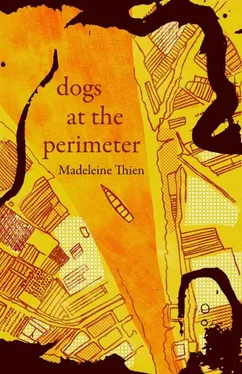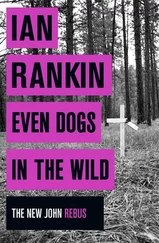The door bursts open and for a moment the room is stunningly bright. My father leans down, scoops my brother up. I see the pale soles of Sopham’s feet kicking in the air. My father looks down at where I’m curled tight as ball. “Aha!” he says. “My little chickens, hiding from the farmer!” He carries us, laughing, screaming in terror, out into the gathering.
Years later, when I remembered the story of Vesna Vulovic, I tried to find her in the archived newspapers of the Vancouver Public Library. As I turned the microfilm, an image, eerily familiar, stopped my hand: an exhausted face subsiding into white pillows. I paid for a printout of the image. Vesna’s plane had been shot down by two surface-to- air missiles, fired by the Czechoslovak military because the Yugoslavian plane had crossed, innocently, into restricted airspace. “I’m not lucky,” she said. “Everybody thinks I’m lucky, but they are mistaken. If I were lucky I would never have had this accident.” She sounded ungrateful but she was not. I understood. I remembered arriving in Canada, my stomach clenched, ashamed that I had lived yet terrified of disappearing. Chance had favoured us, but chance had denied so many others.
At home, I taped Vesna’s picture to my bedroom wall. For long stretches of time I would lie on the carpet, staring up at her. Sometimes I would see the shadows of Lena’s feet, faint beneath the door. Like messages, I told myself. Missives. Janie, sweetheart. Can I come in? I was twelve when I arrived in Vancouver, when Lena became my foster mother. We’d sit and watch tv together, The Nature of Things , game shows, movies of the week, anything that might improve my English. But television, with its dizzying pictures and chaotic chatter, with its sudden images of love and violence, disturbed me. I turned instead to the shelves and shelves of books. Even though my reading was slow, painstaking, I worked my way through her collection. She was devoted to biographies — she admired mathematicians Kurt Gödel and Emma Noether and neuroscientists Santiago Ramón y Cajal and Alexander Luria.
To the surprise of my new mother, I stole these books as frequently as I stole canned food from the cupboards, and I hoarded all the words for myself. In my mind, it was as if these people walked through Lena’s rooms, as if they were family and they were still alive.
Every weekend, Lena would descend into her office. “Down to the basement,” she would say. “Down to my ballroom.” Lena, an academic, wrote about the history of science. Her world was populated with mathematicians, physicists, chemists, and biologists, with the institutes and the drawing rooms of another era. Todd, my foster father, lived in Nepal and worked for Unicef, and he came home once each year, at Christmas. Some days, my new mother would spend hours sifting through piles of paper, trying to lay hands on a single reference. “Hopeless!” she would say, turning away from me, trying to mask her sadness. “Like trying to find a peanut floating through outer space.”
From the time I was sixteen years old, I worked in the ballroom, helping Lena organize her documents. Not just papers, she would have said, but thoughts. Her office was a city all its own: towers of research notes, clippings, books, interview transcripts, recordings. I wanted to be of use to her, to repay her somehow. I liked the idea that I could stand in her place and find my way along the avenues she had built, the knowledge she had accumulated.
One night, wanting to surprise me, Lena dusted off the projector and sat me down in the living room. The sofa was covered with brown velour, a fabric unfamiliar to me, and I always felt as if I were sitting on an animal. The film spun into life. I gazed up, mesmerized by the world projected onto the white wall. I saw a much younger Lena walking on the beaches of Kep, on the southern coast of Cambodia. The camera closed in on Lena’s bathing cap and her lemon-coloured dress. She and Todd had vacationed there in the 1960s, when Cambodia was at peace, a few years before the fighting had begun. She had never forgotten it, she told me, the heat, the saffron temples, the sea. She and Todd had been newlyweds.
Night after night, I crept downstairs, thieved the reels, and fed the film into the machine. I sat on the couch staring up, hearing only the ticking of the projector as the reels spun and the tape ran, and this clicking became the wordless sadness of a lost time. I saw the skyline and the light-flecked water, Lena’s legs smooth against the ocean as she dove and dove again. In another reel, the city of Phnom Penh flickered grainily into the room. Todd, holding the camera, turned slowly, taking us in a 360-degree tour of the intersection in front of the Central Market. Cars glided, cyclos wobbled through the field of vision, and families, clothed in oranges and pinks and browns, turned to stare into the lens. The images came one after the other, now in a place I recognized, and now not. There was no order, no chronology, yet it was so real I could smell it, I could feel the city’s grit on my skin.
One night, I sat on the edge of Lena’s bed and told her that I wanted a new name, a new existence, and she had stared at me, her eyes wet with tears. I admired those tears, she was not ashamed of them, or frightened by them. Jane. Janie . In the language of the aid world, I was an unaccompanied minor, a separated child, but Lena told me that I was no such thing at all. “Sometimes,” she said, across the gap of space I kept between us on the bed, “we are granted a second chance, a third one. You don’t have to be ashamed of having lived many lives.”
I thought of my friend Bopha, about my brother, Sopham, and my parents, I wanted to tell Lena that we were too many, that I needed to guard the world that held us all together. I was afraid that I would drop it, shatter it, let it break apart.
The Khmer Rouge had taken Phnom Penh and then, quietly, they had gone around and severed the lines that connected us to the outside world. They named their own leadership, their own government, Angkar. The word means “the centre” or “the organization.” In the beginning, our family had stayed together. But afterwards, when it was no longer possible, I tried to imagine a way back. Time had to be held, twisted, cut wide open.
Angkar had been obsessed with recording biographies. Every person, no matter their status with the Khmer Rouge, had to dictate their life story or write it down. We had to sign our names to these biographies, and we did this over and over, naming family and friends, illuminating the past. My little brother and I were only eight and ten years old but, even then, we understood that the story of one’s own life could not be trusted, that it could destroy you and all the people you loved.
There is no air in the apartment, but I don’t want to open the windows as I fear that the ice will come inside. I get up, throw a coat over my wrinkled clothes and a hat on my head. Out, out, out. Down the treacherous stairs, sliding along the invisible sidewalk. My brother is here. Sopham and I take the quiet streets, we file past the silent houses. I am drawn to the windows, to rooms lit by the inconstant blue of their televisions. A car swerves around me, the driver punctures the silence with his impatient horn, but I am moving with the slowness of the old. When I get too warm, I pull my hat off and hang it on the spoke of a fence. My brother walks ahead of me. He is small and thin and he finds the cold difficult. Where are his shoes? I look everywhere for them until my hands are numb with cold. Tomorrow I will not remember where my hat is, tomorrow I will feel confusion, but for now I duck into St. Kevin’s Church. On the bitterest winter nights, they leave the front doors unlocked. My brother trails behind me. I sink both hands into the holy water and bring my fingers to my eyes. We sit in the very last row and gaze at a man, kneeling in prayer, who seems to be thinking of the heavens, of the high windows that no one can reach, he is somewhere far, far above us. The smell of incense calms me. Long ago, I read that the cathedral in Phnom Penh had, in 1975, been dynamited. Even the very foundations were dug out, as if to prevent these foreign ruins from ever competing with our own. The vast temples of Angkor Wat, the old kingdoms of Funan and Chenla, were the markers of a history that went back two thousand years. All else, the Khmer Rouge insisted, was mere transience.
Читать дальше












